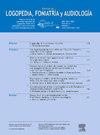患有和未患有自闭症谱系障碍的西班牙语儿童的概念从属关系
Q3 Nursing
引用次数: 0
摘要
自闭症谱系障碍(ASD)是一种神经发育障碍,其特征是长期和显著的沟通和社会互动困难。纵向研究表明,那些在语言和非语言技能方面存在缺陷的孩子在成年后的生活中有更大的不利后果的风险。在这个框架中,语法复杂性构成了这个过程的关键因素,因为它不仅意味着系统的结构领域,而且意味着系统的功能领域。目的分析典型发展(TD)和ASD儿童口语生产中概念从属关系及其编码形式的语言复杂性。方法采用描述性、非实验设计的横断面混合方法研究。样本由19名接受学校整合计划的正规教育机构的学生组成:TD组(n = 11), ASD组(n = 8)。通过从句生成测试进行测量。结果两组学生在概念从属的产生和编码形式上没有显著差异。然而,在两个定性类别上有明显的差异:不语法和视觉刺激的滥用,在ASD组中存在更多的存在。本文章由计算机程序翻译,如有差异,请以英文原文为准。
La subordinación conceptual en niños hispanohablantes con y sin trastorno del espectro autista
Autism spectrum disorder (ASD) is a neurodevelopmental condition characterized by long-lasting and significant difficulties in communication and social interaction. Longitudinal studies show that those children who present deficiencies in verbal and non-verbal linguistic skills are at greater risk of having unfavorable outcomes in adult life. Within this framework, grammatical complexity constitutes a key element in this process, since it implies not only a structural domain of the system, but also a functional one.
Objective
To analyze linguistic complexity through conceptual subordination and its forms of coding in the oral production of Spanish-speaking children with typical development (TD) and ASD.
Method
Cross-sectional mixed approach study with descriptive, non-experimental design. The sample was made up of 19 who attended regular educational establishments with a school integration program: TD group (n = 11), ASD group (n = 8). The measurement was conducted through the Subordinate Clause Production Test.
Results
The results allow us to conclude that there are no significant differences in the production of conceptual subordination and in the forms of coding between both groups. However, significant differences were evident in two qualitative categories: ungrammaticality and misuse of visual stimuli with a greater presence in the ASD group.
求助全文
通过发布文献求助,成功后即可免费获取论文全文。
去求助
来源期刊

Revista de Logopedia, Foniatria y Audiologia
Nursing-LPN and LVN
CiteScore
1.10
自引率
0.00%
发文量
28
 求助内容:
求助内容: 应助结果提醒方式:
应助结果提醒方式:


